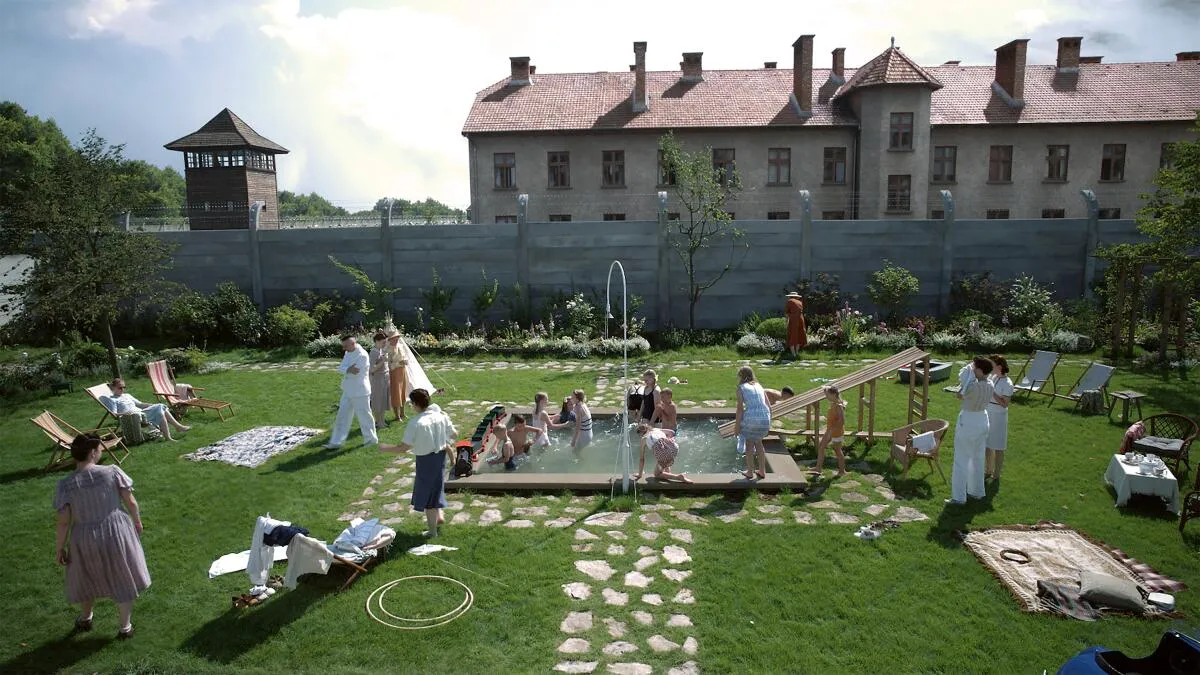“The Zone of Interest” depicts life in a Nazi household right next to Auschwitz. While a lone barbed wall separates the two premises, guttural cries, gunshots and screams can be perpetually heard in the peripheral. The sights inside the walls are never shown, but the sound is unnerving enough, puncturing and debasing the silence. For the inhabitants, a family consisting of Auschwitz commandant Rudolf Höss (Christian Friedel), his wife Hedwig (Sandra Hüeller) and their children, life happens undisturbed and routinely. Johnathan Glazer’s decision to focus on this formal disconnect reframes a story of mundanity into something deeply and consciously unsettling.
The time spent with the Höss family’s domestic tediums is intertwined with death and Glazer makes sure of this. It’s not just the fumes from the camp’s smokestacks that choke their sky that are disquiet, but also the apathetic application of lipstick from a woman no longer alive or the usage of the ashes of numerous to fertilize garden plants. In another instance, Rudolf and the children’s leisure at a river is cut short when ashes and carbonized remains begin to seep into the water. The patriarch yells, quickly pulling them out in what’s the most amount of urgency or concern displayed in the film, with the second most panicked moment being whenever Hedwig lashes out at the housekeepers. After, the children return home and are cleaned furiously, crying at the thought of what could’ve infringed upon them. Through these scenes and the uncannily pristine images shot by Łukas Żal, we understand the extent to which these people have embodied the doctrines of racial hygiene and sanitization.
The only time Glazer pulls significant focus away from the Höss family is to a Polish girl who sneaks onto labor sites, caching food for the prisoners. The switch, showing the smallest acts of action and humanity, is a damning contrast to what we’ve spent so much time observing. All of it is shot in thermal and, though the images are striking, conveying the heightened sense of danger the girl is indebting herself into, it’s an unconventional choice that doesn’t sit right in a film whose maxim is that of restraint.
Towards the film’s closing, Glazer pivots from the domestic and moves into the professional, giving more insight into Rudolf and his profane work. In one telling sequence, Rudolf appears distraught (Friderel’s performance reaches new heights after here) during an otherwise celebratory situation. Later, when he calls Hedwig, he reveals that all he could think about during the festivity was killing and how to do it efficiently. Even with the evil that we’ve attached to Rudolf from the start, it’s a shocking moment — this is a man whose identity and livelihood revolve around bloodsport.
The ending is perhaps Glazer’s biggest swing and his biggest payoff. Without mentioning any spoilers, the narrative is briefly cut, connecting two storylines through unimaginable evil across space and time. It’s gutting, unforgettable and a more than appropriate way to conclude a story where so much human life is disregarded and absent.
Verdict: “The Zone of Interest’s” counterintuitive approach does not try to dramatize or even depict the atrocities of the Holocaust. Rather, it observes those culpable; it’s an extraordinary accomplishment.








